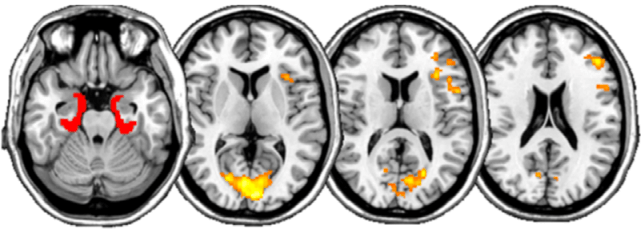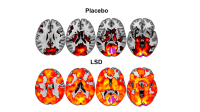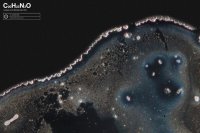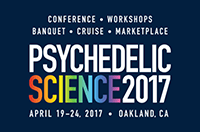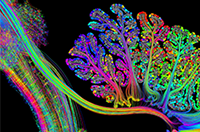
Why Taking LSD Makes Music More Meaningful
In the popular imagination, a psychedelic trip is nothing more than a kaleidoscopic display: vivid hallucinations and free-wheeling ideas. So users of psychedelics are often surprised to discover that it’s the sense of significance that strikes them most. Thoughts, music, and images become weighted with profound and unfathomable meaning, which is perhaps why psychedelics and religious practice are bound together in so many cultures, and why modern psychedelic culture retains mystical overtones.
But how can you scientifically measure something as ineffable as the sense of significance found in a psychedelic experience? This might seem futile, and until recently would have been impossible because of recalcitrant research regulations. But this year, a psychiatric laboratory in Zurich has found a way to do just that.
The key to the puzzle was music. Lead researcher Katrin Preller asked her participants to choose six short music excerpts that they found personally meaningful. She then matched these excerpts to similar-sounding, but neutral or meaningless, excerpts. Participants rated the meaningfulness of all these excerpts both under placebo and LSD.
Unsurprisingly, participants rated their meaningful music excerpts as more meaningful than the neutral or meaningless excerpts, whatever they had taken. But under LSD, their experience of the neutral and meaningless music also became more meaningful.
What’s more, Preller used functional magnetic resonance imaging (fMRI) to examine how brain activation changed during these different musical experiences, discovering that certain regions in the prefrontal cortex become more active, specifically in conjunction with the increased sense of significance that LSD produced.
The prefrontal cortex is known to be involved in representing personal information, holding autobiographical memories and making long-term decisions, especially those with strong emotional outcomes. It seems only natural, then, that this sense of significance activates this high-level, high-stakes processing and decision making region.
These results were exciting for us at the Beckley Foundation, as just last year the Beckley/Imperial Research Programme conducted its own study of how music affects the brain under LSD. We played participants music under both placebo and LSD, and found that LSD increased the sense of wonder, transcendence, power, and tenderness.
Listening to music on LSD increased connectivity between the PHC (red) with various other regions (yellow), particularly the visual cortex
We also analysed how connectivity within the brain was affected by LSD and music, finding a specific increase between the parahippocampal cortex (PHC) and visual cortex. The PHC is involved in emotion, memory, and functions involving the self. If that sounds similar to the prefrontal cortex’s role, it’s because these two regions do in fact work together a lot; they’re both part of the Default Mode Network (DMN), a network which activates when the mind is not engaged with a specific task, and may underlie introspection.
The combination of LSD and music allowed the PHC to talk to the visual cortex, which could explain how visual hallucinations may have an especially autobiographical and emotional feel, and why these sensations have often been reported as enhanced by music.
Understanding how the meaning of music is altered by psychedelics has allowed us to connect this experience to emotion and our sense of selfhood while placing it on a neurological footing. These are only tantalizing glimpses so far; we’ve got a way to go before we unpick how the complex and profound experiences of music, meaning, memories and mysticism interrelate. But it looks like psychedelics will be essential tools on the road ahead, allowing us to examine how consciousness shifts under their influence, and in doing so, how normal consciousness operates.
Psychedelics are like a stone dropped into the pool of consciousness, allowing us to watch how the ripples spread.
Words: Benjamin Taub
Podcast
- All
Links
- All
Support
- All
BIPRP
- All
Science Talk
- All
Amanda's Talks
- All
- Video Talk
- Featured
- 2016 Onwards
- 2011-2015
- 2010 and Earlier
- Science Talk
- Policy Talk
One-pager
- All
Music
- All
Amanda Feilding
- All
Events
- All
Highlights
- All
Psilocybin for Depression
- All
Current
- All
Category
- All
- Science
- Policy
- Culture
Substance/Method
- All
- Opiates
- Novel Psychoactive Substances
- Meditation
- Trepanation
- LSD
- Psilocybin
- Cannabis/cannabinoids
- Ayahuasca/DMT
- Coca/Cocaine
- MDMA
Collaboration
- All
- Beckley/Brazil Research Programme
- Beckley/Maastricht Research Programme
- Exeter University
- ICEERS
- Beckley/Sant Pau Research Programme
- University College London
- New York University
- Cardiff University
- Madrid Computense University
- Ethnobotanicals Research Programme
- Freiburg University
- Medical Office for Psychiatry and Psychotherapy, Solothurn
- Beckley/Sechenov Institute Research programme
- Hannover Medical School
- Beckley/Imperial Research Programme
- King's College London
- Johns Hopkins University
Clinical Application
- All
- Depression
- Addictions
- Anxiety
- Psychosis
- PTSD
- Cancer
- Cluster Headaches
Policy Focus
- All
- Policy Reports
- Advisory Work
- Seminar Series
- Advocacy/Campaigns
Type of publication
- All
- Original research
- Report
- Review
- Opinion/Correspondence
- Book
- Book chapter
- Conference abstract
- Petition/campaign
Search type

